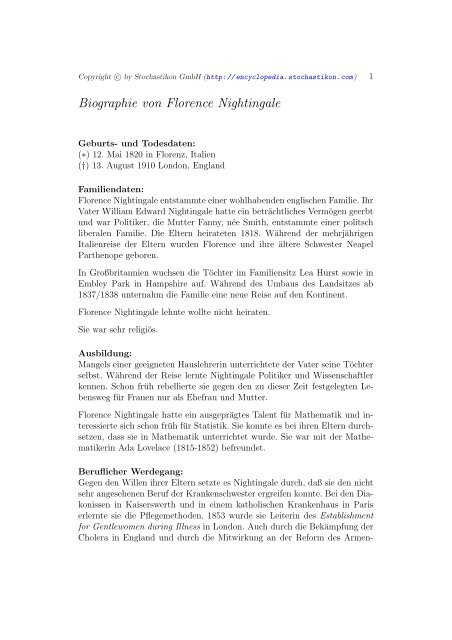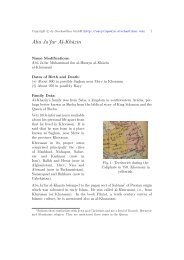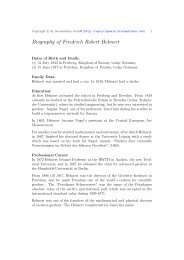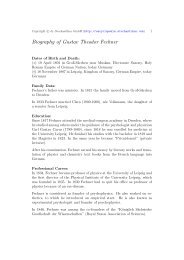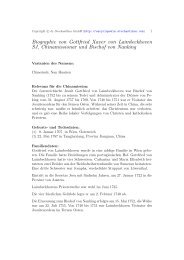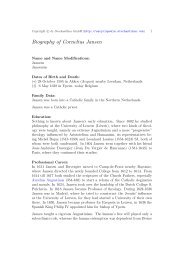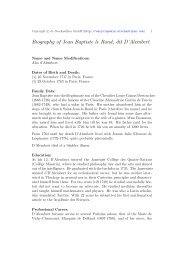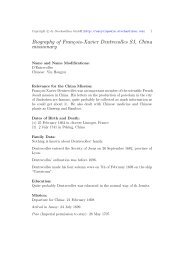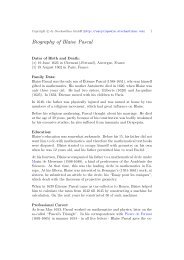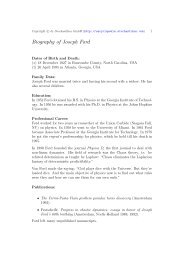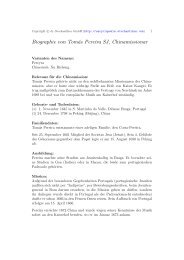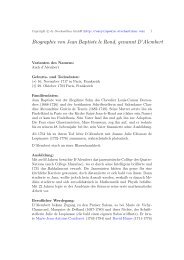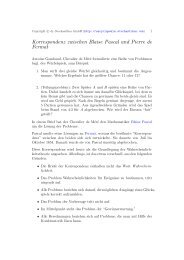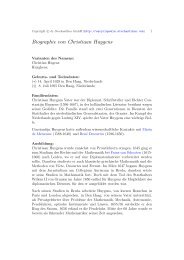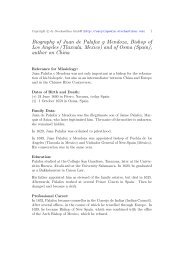Biographie von Florence Nightingale
Biographie von Florence Nightingale
Biographie von Florence Nightingale
Sie wollen auch ein ePaper? Erhöhen Sie die Reichweite Ihrer Titel.
YUMPU macht aus Druck-PDFs automatisch weboptimierte ePaper, die Google liebt.
Copyright c○ by Stochastikon GmbH (http://encyclopedia.stochastikon.com) 1<br />
<strong>Biographie</strong> <strong>von</strong> <strong>Florence</strong> <strong>Nightingale</strong><br />
Geburts- und Todesdaten:<br />
(∗) 12. Mai 1820 in Florenz, Italien<br />
(†) 13. August 1910 London, England<br />
Familiendaten:<br />
<strong>Florence</strong> <strong>Nightingale</strong> entstammte einer wohlhabenden englischen Familie. Ihr<br />
Vater William Edward <strong>Nightingale</strong> hatte ein beträchtliches Vermögen geerbt<br />
und war Politiker, die Mutter Fanny, née Smith, entstammte einer politsch<br />
liberalen Familie. Die Eltern heirateten 1818. Während der mehrjährigen<br />
Italienreise der Eltern wurden <strong>Florence</strong> und ihre ältere Schwester Neapel<br />
Parthenope geboren.<br />
In Großbritannien wuchsen die Töchter im Familiensitz Lea Hurst sowie in<br />
Embley Park in Hampshire auf. Während des Umbaus des Landsitzes ab<br />
1837/1838 unternahm die Familie eine neue Reise auf den Kontinent.<br />
<strong>Florence</strong> <strong>Nightingale</strong> lehnte wollte nicht heiraten.<br />
Sie war sehr religiös.<br />
Ausbildung:<br />
Mangels einer geeigneten Hauslehrerin unterrichtete der Vater seine Töchter<br />
selbst. Während der Reise lernte <strong>Nightingale</strong> Politiker und Wissenschaftler<br />
kennen. Schon früh rebellierte sie gegen den zu dieser Zeit festgelegten Lebensweg<br />
für Frauen nur als Ehefrau und Mutter.<br />
<strong>Florence</strong> <strong>Nightingale</strong> hatte ein ausgeprägtes Talent für Mathematik und interessierte<br />
sich schon früh für Statistik. Sie konnte es bei ihren Eltern durchsetzen,<br />
dass sie in Mathematik unterrichtet wurde. Sie war mit der Mathematikerin<br />
Ada Lovelace (1815-1852) befreundet.<br />
Beruflicher Werdegang:<br />
Gegen den Willen ihrer Eltern setzte es <strong>Nightingale</strong> durch, daß sie den nicht<br />
sehr angesehenen Beruf der Krankenschwester ergreifen konnte. Bei den Diakonissen<br />
in Kaiserswerth und in einem katholischen Krankenhaus in Paris<br />
erlernte sie die Pflegemethoden. 1853 wurde sie Leiterin des Establishment<br />
for Gentlewomen during Illness in London. Auch durch die Bekämpfung der<br />
Cholera in England und durch die Mitwirkung an der Reform des Armen-
Copyright c○ by Stochastikon GmbH (http://encyclopedia.stochastikon.com) 2<br />
gesetzes wurde sie bekannt. Durch das <strong>von</strong> ihrem Vater gewährte jährliche<br />
Einkommen konnte sie sich ganz ihrer Berufung widmen.<br />
Als Berichte über die katastrophale Situation der während des Krimkrieges<br />
verwundeten Soldaten bekannt wurden, reiste <strong>Nightingale</strong> im Auftrag des<br />
Kriegsministeriums zusammen mit 38 Krankenschwestern und Ausrüstung<br />
zum Lazarett in Üsküdar bei Istanbul 1853. <strong>Nightingale</strong> organiserte und verbesserte<br />
das Ganze, was die britischen Militärs als Einmischung <strong>von</strong> Zivilpersonen<br />
ansahen. Durch ihre nächtlichen Kontrollgänge dort erhielt sie den<br />
liebevollen Spitznamen “Lady with the Lamp”. Als sie schwer erkrankte,<br />
mußte sie nach England zurück. Ihr Einsatz regte Henri Dunant (1828-1910)<br />
zur Gründung des Roten Kreuzes an.<br />
Mit einer großen Geldspende gründete sie 1860 ein <strong>Florence</strong>-<strong>Nightingale</strong>-<br />
Stiftung mit einer Krankenpflegeschule am St. Thomas Hospital in London.<br />
Vor allem sorgte sie für eine solide Ausbildung der Krankenschwestern. 1861<br />
gründete sie eine Hebammenschule am King’s College in London. Ihr System<br />
setzte sich in ganz Europa und vielen Ländern durch. 1869 eröffnete<br />
sie zusammen mit der Ärztin Elizabeth Blackwell (1821-1910) das Women’s<br />
Medical College. Unter ihrer Leitung als Ratgeberin für das britische Gesundheitswesen<br />
wurden Statistiken zu Bevölkerungszahlen sowie Geburtsund<br />
Todesraten und Todesursachen eingeführt. Sie machte Krankenpflege zu<br />
einem angesehenen Frauenberuf.<br />
Sie wurde Pionierin der Anwendung statistischer Hilfsmittel auf dem Gebiet<br />
der Epidemiologie. Außerdem gehörte sie der Bewegung des englischen Feminismus<br />
an und war die Verfechterin einer Art Theologie der Befreiung.<br />
Wichtige Veröffentlichungen:<br />
• The collected works of <strong>Florence</strong> <strong>Nightingale</strong>, 10 vols. (Waterloo, Ontario<br />
2001-2007): vol. 1: <strong>Florence</strong> <strong>Nightingale</strong>: an introduction to her<br />
life and family; vol. 2: <strong>Florence</strong> <strong>Nightingale</strong>’s spiritual journey: biblical<br />
annotations, sermons and journal notes; vol. 3: <strong>Florence</strong> <strong>Nightingale</strong>’s<br />
theology: essays, letters and journal notes; vol. 4: <strong>Florence</strong> <strong>Nightingale</strong><br />
on mysticism and eastern religions; vol. 5: <strong>Florence</strong> <strong>Nightingale</strong> on society<br />
and politics, philosophy, science, education and literature; vol. 6:<br />
<strong>Florence</strong> <strong>Nightingale</strong> on public health care; vol. 7: <strong>Florence</strong> <strong>Nightingale</strong>’s<br />
European travels; vol. 8: <strong>Florence</strong> <strong>Nightingale</strong> on women, medicine,<br />
midwifery and prostitution; vol. 9: <strong>Florence</strong> <strong>Nightingale</strong> on health in
Copyright c○ by Stochastikon GmbH (http://encyclopedia.stochastikon.com) 3<br />
India; vol. 10: <strong>Florence</strong> <strong>Nightingale</strong> on social change in India.<br />
• <strong>Nightingale</strong>, public health and Victorian society: from the British Library,<br />
London (Microfilm edition, Marlborough 2003-).<br />
• Lori Williamson (ed., intr.), <strong>Florence</strong> <strong>Nightingale</strong> and the birth of professional<br />
nursing, 6 vols. (London 1860-1914; Bristol 1999).<br />
• Eastern hospitals and English nurses: the narrative of 12 month’s experience<br />
in the hospitals of Roulalai and Skutari (London 1857).<br />
• Notes on matters affecting the health, efficiency and hospital administration<br />
of the British army, founded chiefly on the experience of the<br />
late war (London 1858).<br />
• Notes on nursing: [what it is and what it is not] for the labouring classes<br />
(London 1860, 1861; London 1952; New York 1969; London 1970;<br />
Philadelphia 1992; London 1993), deutsch: Die Pflege bei Kranken und<br />
Gesunden: kurze Winke, den Frauen aller Stände gewidmet... (Leipzig<br />
1861), auch: Rathgeber für Gesundheits- und Krankenpflege (Leipzig<br />
1878; Wiesbaden 1980), auch: Bemerkungen zur Krankenpflege: die<br />
“Notes on Nursing” neu übersetzt und kommentiert (Frankfurt 2005),<br />
französisch: Des soins à donner aux malades ce qu’il faut faire, ce qu’il<br />
faut éviter... (Paris 1869).<br />
• How people may live and not die in India (London 1864).<br />
• Organization of nursing: an account of the Liverpool Nurses’ Training<br />
School, its foundation, progress, ... (Liverpool 1865).<br />
• Notes on hospitals (London 1859; 1863), deutsch: Bemerkungen über<br />
Hospitäler (Memel 1866; Frankfurt 1975).<br />
• Introductory notes on Lying-in institutions: together with a proposal for<br />
organising an institution for training midwives and midwifery nurses<br />
(London 1871).<br />
• Life or death in India: a paper read at the Meeting of the National Association<br />
for the promotion of Social Science, Norwich, 1873 (London<br />
1874).<br />
• Letters from Miss <strong>Florence</strong> <strong>Nightingale</strong> on health visiting in rural districts<br />
(London 1911-1914; Bristol 1999).<br />
• Indian Letters (Calcutta 1937).
Copyright c○ by Stochastikon GmbH (http://encyclopedia.stochastikon.com) 4<br />
• Selected writings (New York 1954).<br />
• The institution of Kaiserswerth on the Rhine for the Practical Training<br />
of Deaconesses (Düsseldorf-Kaiserswerth 1956, 1959).<br />
• The Derbyshire Home of <strong>Florence</strong> <strong>Nightingale</strong> (Ripley, Derby 1970).<br />
• <strong>Florence</strong> <strong>Nightingale</strong> in Rome: letters written by <strong>Florence</strong> <strong>Nightingale</strong><br />
in Rome in the winter of 1847-1848 (Philadelphia 1981).<br />
• The institution of Kaiserswerth on the Rhine, for the practical training<br />
of deaconisses, under the direction of Rev. Pastor Fliedner (Düsseldorf-<br />
Kaiserswerth 1982).<br />
• “I have done my duty”. <strong>Florence</strong> <strong>Nightingale</strong> in the Crimean War 1854-<br />
56 (Manchester 1987).<br />
• Letters from Egypt: a journey on the Nile: 1849-50 (New York 1987).<br />
• <strong>Florence</strong> <strong>Nightingale</strong> on hospital reform (New York 1989).<br />
• Ever yours, <strong>Florence</strong> <strong>Nightingale</strong>: selected letters (London 1989; Cambridge,<br />
Mass. 1990).<br />
• Cassandra and other selections from suggestions for thought (London<br />
1991; New York 1992).<br />
• Suggestions for thought (Philadelphia 1994).<br />
• Letters from Crimea: 1854-1856 (Manchester 1997).<br />
• Michael D. Calabria (ed.), <strong>Florence</strong> <strong>Nightingale</strong> in Egypt and Greece:<br />
her diary and “visions” (Albany 1997).<br />
• <strong>Florence</strong> <strong>Nightingale</strong> and the Crimea, 1854-55 (London 2000).<br />
Wissenschaftliche Ehrungen:<br />
1858 wurde <strong>Florence</strong> <strong>Nightingale</strong> als erste Frau in die Royal Statistical Society<br />
aufgenommen. Später erhielt sie die Ehrenmitgliedschaft in der American<br />
Statistical Association.<br />
Referenzen und weiterführende Literatur:<br />
• Elizabeth Abbott, A history of celibacy: from Athena to Elizabeth I, Leonardo<br />
da Vinci, <strong>Florence</strong> <strong>Nightingale</strong>, Ghandi, and Cher (New York 2000).
Copyright c○ by Stochastikon GmbH (http://encyclopedia.stochastikon.com) 5<br />
• Mary Raymond Shipman Andrews, A lost commander, <strong>Florence</strong> <strong>Nightingale</strong><br />
(Garden City NY 1929).<br />
• Monica E. Baly, <strong>Florence</strong> <strong>Nightingale</strong> and the nursing legacy (London 1997,<br />
1998).<br />
• William John Bishop, A bio-bibliography of <strong>Florence</strong> <strong>Nightingale</strong> (London<br />
1962).<br />
• Mark Bostridge, <strong>Florence</strong> <strong>Nightingale</strong>: the woman and her legend (London<br />
2008).<br />
• Nancy Boyd, Josephine Butler, Octavia Hill, <strong>Florence</strong> <strong>Nightingale</strong>: three<br />
Victorian women who changed their world (London 1982).<br />
• Frauke Brauns, <strong>Florence</strong> <strong>Nightingale</strong>: Kaiserswerth zund die britische Legende;<br />
zum 250jährigen Jubiläum der Erstveröffentlichung <strong>von</strong> <strong>Florence</strong> Nightigales<br />
Bericht über die Diakonissenanstalt Kaiserswerth und ihrer Ausbildung<br />
in Kaiserswerth (Düsseldorf 2001).<br />
• Vern L. Bullough (ed.), <strong>Florence</strong> <strong>Nightingale</strong> and her era: a collection of<br />
new scholarship; [papers from a conference held at the University of Buffalo]<br />
(New York 1990).<br />
• Anne Colver, <strong>Florence</strong> <strong>Nightingale</strong>: war nurse (New York 1966).<br />
• Edward Cook, The life of <strong>Florence</strong> <strong>Nightingale</strong>, 2 vols. (London 1913).<br />
• Zachary Cope, Six disciples of <strong>Florence</strong> <strong>Nightingale</strong> (London 1961).<br />
• Johanna Crome, <strong>Florence</strong> <strong>Nightingale</strong>: eine Samariterin nach dem Herzen<br />
Gottes (Berlin 1898).<br />
• Barbara Montgomery Dossey, <strong>Florence</strong> <strong>Nightingale</strong>: mystic, visionary, healer<br />
(Springhouse, Pa. 1999).<br />
• Emma Fischel, <strong>Florence</strong> <strong>Nightingale</strong> (London 2000).<br />
• Immanuel Friz, <strong>Florence</strong> <strong>Nightingale</strong>: eine Heldin des Dienstes (Stuttgart<br />
1932).<br />
• Wolfgang Genschorek, Schwester <strong>Florence</strong> <strong>Nightingale</strong>: Triumph der Menschlichkeit<br />
(Leipzig 1990).<br />
• Ursula Geppert, Frauen stehen ihren Mann (Lahr 1999).<br />
• Gillian Gill, <strong>Nightingale</strong>s: the story of <strong>Florence</strong> <strong>Nightingale</strong> and her remarkable<br />
family (London 2004).<br />
• Judith Godden, Lucy Osborn, a lady displaced: <strong>Florence</strong> <strong>Nightingale</strong>’s envoy<br />
to Australia (Sydney 2006).<br />
• Richard Gordon, The private life of <strong>Florence</strong> <strong>Nightingale</strong> (London 1978).<br />
• Jharna Gourlay, <strong>Florence</strong> <strong>Nightingale</strong> and the health of the Raj (Aldershot<br />
2003).<br />
• Anna Hamilton, <strong>Florence</strong> <strong>Nightingale</strong> (Neuilly 1933).<br />
• Barbara Harmelink, <strong>Florence</strong> <strong>Nightingale</strong> (London 1972).<br />
• Colleen Adele Hobbs, <strong>Florence</strong> <strong>Nightingale</strong> (New York 1997).<br />
• Renate Hofmann, “<strong>Nightingale</strong>”, Die Religion in Geschichte und Gegen-
Copyright c○ by Stochastikon GmbH (http://encyclopedia.stochastikon.com) 6<br />
wart 6 (Tübingen 2003) col. 319.<br />
• Max Horndasch, Die Lady mit der Lampe (Bonn 1948).<br />
• Ruth Y. Jenkins, Reclaiming myths of power: women writers and the Victorian<br />
spiritual crisis (Lewisburg 1995).<br />
• Benjamin Jowett, Dear Miss <strong>Nightingale</strong>: a selection of Benjamin Jowett’s<br />
letters to <strong>Florence</strong> <strong>Nightingale</strong>; 1860-1893 (Oxford 1987).<br />
• Catherine Judd, Besides seductions: nursing and the Victorian imagination,<br />
1830-1880 (New York 1998).<br />
• M. Keele, <strong>Florence</strong> <strong>Nightingale</strong> in Rome (New York 1981).<br />
• Ellen Key, <strong>Florence</strong> <strong>Nightingale</strong> und Bertha <strong>von</strong> Suttner: zwei Frauen im<br />
Kriege wider den Krieg (Zürich 1919).<br />
• E.W. Kopf, “<strong>Florence</strong> <strong>Nightingale</strong> as a statistician”, Journal of the American<br />
Statistical Association 15 (1916) pp. 388-404, repr. in: M. Kendall, R.K.<br />
Plackett, Studies in the History of Statistics and Probability, vol. II (London<br />
1972) pp. 310-326.<br />
• Dietmar Kruczek, Zwischen Liebe und Reformen: das Leben der <strong>Florence</strong><br />
<strong>Nightingale</strong> (Neukirchen-Vluyn 1999).<br />
• Dietmar Kruczek, Helen Keller, <strong>Florence</strong> <strong>Nightingale</strong> (Magdeburg 2005).<br />
• Werner Legère, Schwester <strong>Florence</strong> (Berlin 1957).<br />
• Georg Lindenlaub, <strong>Florence</strong> <strong>Nightingale</strong>, eine Vorkämpferin in der Krankenfürsorge<br />
(Weinheim 1964).<br />
• Gilbert Morris, God’s handmaiden (Grand Rapids 2004).<br />
• <strong>Florence</strong> <strong>Nightingale</strong>, Geliebtes Kaiserswerth: zum 150jährigen Bestehen<br />
des Diakoniewerkes Kaiserswerth (1836-1986) (Düsseldorf 1986).<br />
• Ida Beatrice O’Malley, <strong>Florence</strong> <strong>Nightingale</strong> 1820-1856 (London 1931).<br />
• Janet Macrae, Nursing as a spiritual practice: contemporary application of<br />
<strong>Florence</strong> <strong>Nightingale</strong>’s views (New York 2001).<br />
• Basil Miller, <strong>Florence</strong> <strong>Nightingale</strong>: the lady of the lamp (Minneapolis 1975).<br />
• Laura Orvieto, <strong>Florence</strong> <strong>Nightingale</strong> (Zürich 1943).<br />
• George Pickering, Creative malady: illness in the lives and minds of Charles<br />
Darwin, <strong>Florence</strong> <strong>Nightingale</strong>, Mary Baker Eddy, Sigmund Freud, Marcel<br />
Proust, Elisabeth Barrett Brwoning (London 1974).<br />
• Helen Rappaport, No place for ladies: the untold story of women in the<br />
Crimean War (London 2007).<br />
• Emmy Carolina Rappe, ’God bless you, my dear Miss <strong>Nightingale</strong>’: letters<br />
from Emmy Carolina Rappe to <strong>Florence</strong> <strong>Nightingale</strong>, 1867-1870 (Stockholm<br />
1977).<br />
• Joan Rees, Writings on the Nile: Harriet Martineau, <strong>Florence</strong> <strong>Nightingale</strong>,<br />
Amelia Edwards (London 1995).<br />
• Louis C. Selanders, <strong>Florence</strong> <strong>Nightingale</strong>: an environmental adaptation<br />
theory (Newbeury Park 1993).
Copyright c○ by Stochastikon GmbH (http://encyclopedia.stochastikon.com) 7<br />
• Lucy Ridgely Seymer, <strong>Florence</strong> <strong>Nightingale</strong> (London 1950).<br />
• Hugh Small, <strong>Florence</strong> <strong>Nightingale</strong>: avenging angel (London 1998).<br />
• Francis Barrymore Smith, <strong>Florence</strong> <strong>Nightingale</strong>: reputation and power (London<br />
1982).<br />
• Anna Sticker, <strong>Florence</strong> <strong>Nightingale</strong> und Kaiserswerth (Düsseldorf 1993).<br />
• M. Stone, “<strong>Florence</strong> <strong>Nightingale</strong>”, in: C.C. Heyde, E. Seneta (eds.), Statisticians<br />
of the Centuries (New York 2002) pp. 171-175.<br />
• Giles Lytton Strachey, Macht und Frömmigkeit: <strong>Florence</strong> <strong>Nightingale</strong>, Kardinal<br />
Manning: zwei Bildnisse aus der viktorianischen Zeit (Berlin 1937).<br />
• Giles Lytton Strachey, Eminent Victorians (London 2002).<br />
• Mary C. Sullivan, The friendship of <strong>Florence</strong> <strong>Nightingale</strong> and Mary Clare<br />
Moore (Philadelphia 1999).<br />
• Beth Tamplet Ulrich, Leadership and management according to <strong>Florence</strong><br />
<strong>Nightingale</strong> (Norwalk, Conn. 1992).<br />
• Rob Van der Peet, The <strong>Nightingale</strong> model of nursing (Edinburgh 1995).<br />
• Manfred Vasold, <strong>Florence</strong> <strong>Nightingale</strong>: eine Frau im Kampf für die Menschlichkeit<br />
(Regensburg 2003).<br />
• Harry Verney, <strong>Florence</strong> <strong>Nightingale</strong> at Harley Street: her reports to the governors<br />
of her nursing home: 1853-4 (London 1970).<br />
• Carl Vossen, <strong>Florence</strong> <strong>Nightingale</strong>, geliebtes Kaiserswerth: zum 150jährigen<br />
Bestehen des Diakoniewerkes Kasierswerth (1836-1986) (Düsseldorf 1986).<br />
• Irmgad Wild, <strong>Florence</strong> <strong>Nightingale</strong> (Freiburg, Schweiz 1980).<br />
• Tim Winkel, Elisabeth Fry und <strong>Florence</strong> <strong>Nightingale</strong> - zwei diakonische Wege<br />
in England: unter besonderer Berücksichtigung der Erweckungsbewegung<br />
(Heidelberg 2006).<br />
• Cecil Woodham-Smith, <strong>Florence</strong> <strong>Nightingale</strong> (München 1952).<br />
• J.J. O’Connor, E.F. Robertson, http://www-groups.dcs.st-and.ac.uk/ history/Mathematicians/<strong>Nightingale</strong>.html<br />
(24. September 2007).<br />
• J.J. O’Connor, E.F. Robertson, http://www-groups.dcs.st-and.ac.uk/ history/References/<strong>Nightingale</strong>.html<br />
(24. September 2007).<br />
• http://www.amstat.org/about/statisticians/index.cfm?fuseaction=biosinfo&<br />
BioID=12 (24. September 2007).<br />
Autor(en) dieses Beitrags:<br />
Claudia <strong>von</strong> Collani<br />
Version: 1.00


